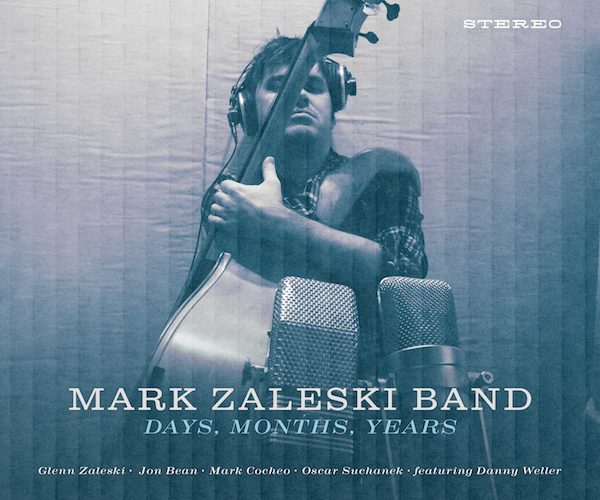Jazz CD Reviews: Cowboys and Frenchmen/ Mark Zaleski Band
Both Cowboys and Frenchmen and Mark Zaleski Band “groove, interact, and emote.”
Bluer Than You Think, Cowboys and Frenchmen (Outside In Music)
Days, Months, Years, Mark Zaleski Band (Mark Zaleski Music)
By Steve Feeney

New discs from Cowboys and Frenchmen and the Mark Zaleski Band feature fine working jazz ensembles that play hard and smart.
The members of Cowboys and Frenchmen are not trying to create “some sort of postmodern stylistic collage.” At least so claims band co-leader Ethan Helm, describing in the album notes how the quintet approached their second CD.
Might the saxophonist be protesting too much?
Bluer Than You Think proffers a carefully and cleverly integrated diversity of musical sources and methods. And there is nothing wrong with that. Most likely what Helm wants to emphasize is that the group’s eclecticism is not a generated by faddishness, but an approach that is rooted from “within ourselves.” That is, it is crucial to what these musicians do. And, despite the band’s connections to several prestigious New York music schools, the emphasis is not on the cerebral: “we still groove, interact and emote,” Helm asserts.
The group enlisted Ryan Truesdell to produce the album. Fans may remember Truesdell’s extraordinary leadership on two recent albums that honor the work of Gil Evans (on which members of Cowboys and Frenchmen participated). Echoes of Evans can be found on the opening track, co-leader Owen Broder’s “Wayfarer.”
After establishing a mysterious harmonic realm, the piece builds on a modal base, adding detail and turbulence as the musical travelers engage with the enigmatic terrain. Broder’s baritone sax growls a bit before Helm’s alto weaves its way into the session before heading off into unfettered expression. Ethan O’Reilly, on bass, and Matt Honor, on drums, drive the rhythm toward what sounds like its ultimate Mediterranean destination.
Then the disc turns toward something completely different. Helm’s “Beasts” circles around and around the tent poles of contemporary minimalism. Pianist Chris Ziemba adds accents of welcome color, suppling a trickling ornamentation that livens up the relentless repetition, which makes a fetish of stability.
Broder’s “Companion Plan” follows, a return to the earlier funk, featuring the leader’s reedy and romantic baritone. A brief solo by Ziemba softens the grit as the piece fades.
Ziemba supplies an Ellington-esque setting for Helm’s “Lilies Beneath the Bridge.” His pensive, to the point of melancholy, ruminations are slightly undercut, to these ears, by some sweet and sour harmonic shenanigans between the two saxophonists.
The title track, by Helm, features some of the finest straight-out blowing on the disc. The group’s soloists pay homage to the band’s commitment to tradition even as they seek (with inventive determination) to freshen up essential blues forms with the sounds of the avant-garde.
Broder’s “Uncommon Sense” rounds out the disc; the gentle touch of O’Reilly’s bass solo floats above and beyond a rhythm section powered by Honor’s flashy cymbals and Ziemba’s impressionistic daubs. It’s a nice finish for an intriguing disc from young musicians who are very much on the rise.

The Mark Zaleski Band has been around for over a decade, but Days, Months, Years is only their second album. Playing mostly original material, their long-term (and very personal) commitment to their music can be heard on these new tracks.
Most of the group’s members were trained at the New England Conservatory of Music. These are musicians who possess all the necessary sophistication to execute progressive mainstream jazz — and they do so with aplomb.
Massachusetts native Zaleski doubles on bass and sax, thanks to studio magic. He’s good on both instruments, but I’d rather hear him play one at a time. On “Mark in the Park,” his alto spins the vibe with a carefree expressiveness. Mark’s brother Glenn Zaleski contributes a bouncy piano line. A bit of drama develops with the arrival of a feisty drum solo from Oscar Suchanek, but we’re quickly returned back to a relaxed stroll home.
The leader’s “Cerina” opens with a boppish joust between Zaleski’s alto and Jon Bean’s tenor sax. An opening is made for Mark Cocheo’s guitar, showing that the band is more than comfortable entering the realm of the electrified. Bean later leans on the choppy rhythm to whip up some post-bop heat.
The title track takes off from a six-note theme. Bean gets another opportunity to wail on tenor before a nicely calm close.
“Katie’s Song” gives us Zaleski approximating some of the intense work contributed by Miles Davis’s soprano sidemen during the master’s electric period (Dave Liebman? Steve Grossman?). Cocheo knows the territory well, and in one glorious central passage brings all the frenzy together.
A pair of classics, Thelonious Monk’s “Epistrophy” and Charlie Parker’s “Big Foot,” complete the disc. The former serves as a trampoline for another electric excursion from Cocheo, backed by Glenn Zaleski on Wurlitzer keyboard. Danny Weller, the band’s regular bassist, is showcased on the Parker tune before Zaleski’s alto plays the bluesy hell out of the piece in a rough and tough trio setting that is accompanied by Suchanek’s rumble and crash.
Prepare for some “rumble and crash” to come your way — both of these bands are currently touring the Northeast and beyond.
Steve Feeney is a Maine native and attended schools in Maine, New Hampshire and Massachusetts. He has a Master of Arts Degree in American and New England Studies from the University of Southern Maine. He began reviewing music on a freelance basis for the Portland Press Herald/Maine Sunday Telegram in 1995. He was later asked to also review theater and dance. Recently, he has added BroadwayWorld.com as an outlet and is pleased to now contribute to Arts Fuse.
Tagged: Bluer Than You Think, Cowboys and Frenchmen, Days Months Years, Mark Zaleski Music, Outside in Music
